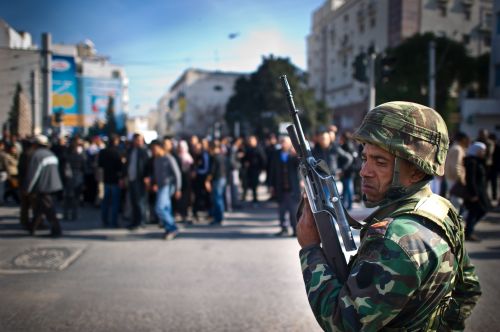Tunisia announces new national unity government after one-party rule, but protesters want more
TUNIS (AP) ― Tunisia took a step toward democracy and reconciliation Monday, promising to free political prisoners and opening its government to opposition forces long shut out of power ― but the old guard held onto the key posts, angering protesters.
Demonstrators carrying signs reading “GET OUT!” demanded that the former ruling party be banished altogether ― a sign more troubles lie ahead for the new unity government as security forces struggle to contain violent reprisals, shootings and lootings three days after the country’s longtime president fled under pressure from the streets.
“We’re afraid that the president has left, but the powers ― that ― be remain,” said Hylel Belhassen, a 51 ― year ― old insurance salesman. Even before the new government was announced Monday, security forces fired tear gas to repel demonstrators who see the change of power as Tunisia’s first real chance at democracy.
President Zine El Abidine Ben Ali fled Friday to Saudi Arabia after a month of protests over unemployment and corruption led to his downfall after 23 years in power. The government announced Monday that 78 civilians have died in the month of unrest ― an announcement that underlined the depth of the violence in the usually placid Mediterranean tourist destination.
Under autocratic Ben Ali, Tunisia was effectively under one-party rule. The new government named Monday includes three ministers from the opposition ― a first in Tunisia ― but members of Ben Ali’s RCD party held on to most of the jobs, including the most important posts.
 |
A soldier stands guard as people demonstrate during a protest in central Tunis on Monday. (AFP-Yonhap News) |
Security forces were getting an image makeover in the public mind. The once-feared police are fighting snipers and armed groups widely believed to be Ben Ali loyalists.
Nearby nations, meanwhile, faced a wave of self-immolation attempts Monday, apparently influenced by the desperate Tunisian man who set himself on fire a month ago, sparking the protests that brought his president down.
In Tunisia, hundreds of stranded tourists were still being evacuated from the country, and foreign airlines gradually resumed flights that were halted when Tunisian airspace closed amid the upheaval.
Besides the 78 civilians killed in the monthlong protests, Interior Minister Ahmed Friaa said 94 civilians were injured ― a jump from the previous official death toll of 23. The new figure does not include members of security forces, some of whom also died, Friaa said.
Among victims of the violence was a French photojournalist who died Monday after being hit in the face with a tear gas canister three days earlier. The French Foreign Ministry said Loucas Von Zabiensky ― Mebrouk, 32, was the “”victim of a deliberate homicidal act.”
The troubles have reverberated to the tourist ― based Tunisian economy, which Friaa said has lost $2 billion (3 billion dinars) because of the unrest. Resort towns like Hammamet are boarded up and under police control, said Norredine Gohdbani, who worked in a restaurant there and has returned to stay with his family in Tunis.
Friaa told reporters that 85 police stations have been damaged around the country, along with 13 town halls, 43 banks, 11 factories and 66 stores or shopping centers.
Streets of the capital appeared calmer Monday but police were posted on most corners in downtown Tunis, with busloads of forces waiting to deploy along some streets. Most shops remained shuttered, but a rare eatery, a pizza restaurant, opened its doors ― filled mostly with hungry police officers.
Prime Minister Mohamed Ghannouchi offered a number of concessions to try to appease Ben Ali’s critics, while maintaining the ruling party’s dominance of government and public posts around the country.
Ghannouchi, a longtime Ben Ali ally who has been premier since 1999, retained his post, as did the current ministers of defense, interior and foreign affairs.
Three opposition figures, including Nejib Chebbi, a founder of the opposition PDP party, will take up posts in the new government.
More significantly, Ghannouchi pledged such measures as freeing political prisoners and lifting restrictions on a leading human rights group, the Tunisian League for the Defense of Human Rights. He said the government would create three new state commissions to study political reform, investigate corruption and bribery, and examine abuses during the recent upheaval.








![[Today’s K-pop] Blackpink’s Jennie, Lisa invited to Coachella as solo acts](http://res.heraldm.com/phpwas/restmb_idxmake.php?idx=644&simg=/content/image/2024/11/21/20241121050099_0.jpg)